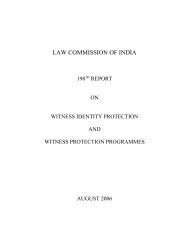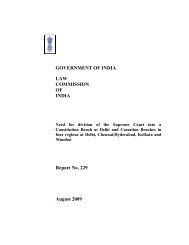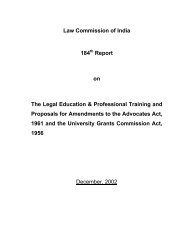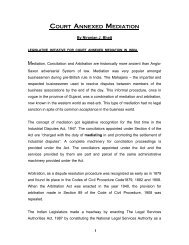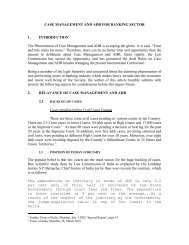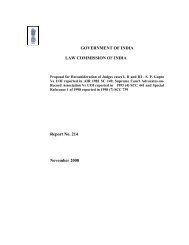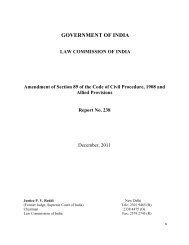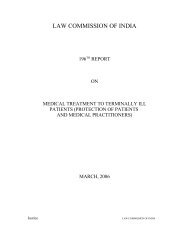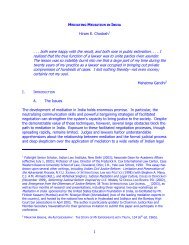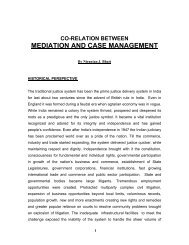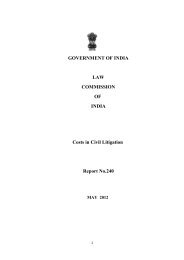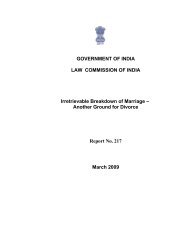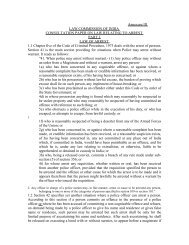case management and its advantages - Law Commission of India
case management and its advantages - Law Commission of India
case management and its advantages - Law Commission of India
Create successful ePaper yourself
Turn your PDF publications into a flip-book with our unique Google optimized e-Paper software.
CASE MANAGEMENT AND ITS ADVANTAGES<br />
By Justice M. Jagannadha Rao<br />
‘Case Management’ as a system <strong>of</strong> rules has not been introduced in<br />
<strong>India</strong>. For the first time, pursuant to the direction issued by the Supreme<br />
Court <strong>of</strong> <strong>India</strong> in SALEM ADVOCATES BAR ASSOCIATION vs.<br />
UNION OF INDIA, the Committee constituted by the Supreme Court in<br />
that <strong>case</strong> has circulated Model Rules in a Consultation Paper sent to the<br />
High Courts, Bar Councils <strong>and</strong> Bar Associations. Some responses have<br />
come in to this paper.<br />
In the Consultation Paper prepared by the Committee appointed by<br />
the Supreme Court, it has tried to explain the concept <strong>of</strong> ‘Case<br />
Management’. It has referred to Lord Woolf’s Interim Report on ‘Access<br />
to Justice’ (http://www.lcd.gov.uk/civil/interim/chap5.htm) <strong>and</strong> to the final<br />
Report <strong>of</strong> Lord Woolf (http://www.lcd.gov.uk/civil/final/contents.htm) <strong>and</strong><br />
the Report <strong>of</strong> the Australian <strong>Law</strong> Reform <strong>Commission</strong> on ‘Judicial<br />
<strong>and</strong> Case Management’ (1996) (http://www.austlii.edu.au/au/other/alrc/<br />
publications/bp/3/<strong>management</strong>.html).<br />
In the United States <strong>of</strong> America, sec. 479(c)(1)-(3) <strong>of</strong> the Civil<br />
Justice Reform Act, 1990 (28.U.S.SC) which required ‘<strong>case</strong> <strong>management</strong>’<br />
systems be introduced, was adopted in response to strong <strong>and</strong> persistent<br />
dem<strong>and</strong> for reform <strong>of</strong> the civil litigation process to reduce cost <strong>and</strong> delay.<br />
In enacting it, Congress stated:<br />
1
“Evidence suggests that an effective litigation <strong>management</strong> <strong>and</strong> cost<strong>and</strong>-delay-reduction<br />
programme should incorporate several<br />
interrelated principles – including –<br />
(A) the differential treatment <strong>of</strong> <strong>case</strong>s that provides for<br />
individualized <strong>and</strong> specific <strong>management</strong> according to their<br />
needs, complexity, duration <strong>and</strong> probable litigation careers;<br />
(B) early involvement <strong>of</strong> a judicial <strong>of</strong>ficer in planning the progress<br />
<strong>of</strong> a <strong>case</strong>, controlling the discovery process, <strong>and</strong> scheduling<br />
hearings, trials <strong>and</strong> other litigation events;<br />
(C) regular communication between a judicial <strong>of</strong>ficer <strong>and</strong><br />
attorneys during the pre-trial process.”<br />
(See Manual for Litigation Management <strong>and</strong> Cost <strong>and</strong> Delay<br />
Reduction, Federal Judicial Centre, 1992, Washington DC)<br />
In the United States, where now <strong>case</strong>-<strong>management</strong> systems are<br />
firmly established, the Federal Judicial Centre, Washington D.C. has<br />
referred to the ‘active role’ <strong>of</strong> the Judge:<br />
“to anticipate problems before they arise rather than waiting<br />
passively for matters to be presented by counsel. Because the<br />
attorneys may be immersed in the details <strong>of</strong> the <strong>case</strong>, innovation <strong>and</strong><br />
creativity in formulating any litigation plan may frequently depend<br />
on the court.”<br />
2
The courts’ substantive role consists <strong>of</strong> the ‘Judge’s involvement’<br />
not merely limited to procedural matters but refers to his becoming<br />
familiar, at an early stage, with the substantive issues in order to make<br />
informal rulings on issues, dispositions, <strong>and</strong> narrowing, <strong>and</strong> on related<br />
matters such as scheduling, bifurcation <strong>and</strong> consideration <strong>and</strong> discovery<br />
control’. The Judge periodically ‘monitors’ the progress <strong>of</strong> the litigation to<br />
see that schedules are being followed <strong>and</strong> to consider necessary<br />
modifications in the litigation plan. The Judge may call for interim reports<br />
between scheduled conferences. But, at the same time, time-lim<strong>its</strong> <strong>and</strong> the<br />
controls <strong>and</strong> requirements are not imposed arbitrarily or without<br />
considering the views <strong>of</strong> counsel, <strong>and</strong> are subject to revision when<br />
warranted by the circumstances. Once having established a programme,<br />
however, the Judge expects schedules to be met <strong>and</strong> when necessary<br />
impose appropriate sanctions for dereliction <strong>and</strong> dilatory tactics (Manual <strong>of</strong><br />
Complex Litigation, 3 rd , 1994, Federal Judicial Centre, Washington D.C.,<br />
quoted in Lord Woolf’s Interim Report, Chapter 5, para 20).<br />
In Canada, according to the Ministry <strong>of</strong> Attorney General Ontario,<br />
Canada, 1993 as quoted in Lord Woolf’s Interim Report, Chapter 5, Para<br />
18, it is stated as follows:<br />
“Case <strong>management</strong> is a comprehensive system <strong>of</strong> <strong>management</strong> <strong>of</strong><br />
time <strong>and</strong> events in a law-suit as it proceeds through the justice<br />
system, from initiation to resolution. The two essential components<br />
<strong>of</strong> <strong>case</strong>-<strong>management</strong> system are the setting <strong>of</strong> a time table for pre-<br />
3
determined events <strong>and</strong> suspension <strong>of</strong> the progress <strong>of</strong> the law-suit<br />
through <strong>its</strong> time-table”.<br />
In Australia, Pr<strong>of</strong>. Sallman <strong>of</strong> the Australian Institute <strong>of</strong> Judicial<br />
Administration (quoted in Lord Woolf’s interim report, Chapter 5, para 9)<br />
stated as follows:<br />
“The Revolution has involved a dramatic shift from a laissez faire<br />
approach in conducting court-business to an acceptance by courts <strong>of</strong><br />
the philosophical principle that it is their responsibility to take<br />
interest in <strong>case</strong>s from a much earlier stage in the process <strong>and</strong> manage<br />
them through a series <strong>of</strong> milestones to check-posts. Most courts<br />
have now acted upon this philosophy <strong>and</strong> introduced a variety <strong>of</strong><br />
schemes, the common denominator <strong>of</strong> which is substantially<br />
increased court supervision <strong>and</strong>, in some instances, control … The<br />
essence <strong>of</strong> it is the adoption by courts <strong>of</strong> a systematic, managerial<br />
approach to dealing with <strong>case</strong> loads.”<br />
(UK) Lord Woolf’s Reports on ‘Case Management’:<br />
Lord Woolf’s ‘<strong>case</strong> <strong>management</strong>’ recommendations, to the extent relevant<br />
for us, are as follows:<br />
(1) There should be a fundamental transfer in the responsibility for<br />
the <strong>management</strong> <strong>of</strong> civil litigation from litigants <strong>and</strong> their legal<br />
advisors to the courts;<br />
(2) The <strong>management</strong> should be provided by a three tier system:<br />
4
(i) an increase in small claim jurisdiction;<br />
(ii) a new fast track for <strong>case</strong>s in the lower end <strong>of</strong> the scale; <strong>and</strong><br />
(iii) a new multi-track for the remaining <strong>case</strong>s<br />
(3) The court shall have an enlarged jurisdiction to give summary<br />
judgment on the application <strong>of</strong> the claimant or defendant or an<br />
courts’ own initiation, on the ground that a <strong>case</strong> (or past <strong>of</strong> a <strong>case</strong>)<br />
has no realistic prospect <strong>of</strong> success.<br />
(4) All <strong>case</strong>s where a defence is received will be examined by a<br />
‘procedural judge’ who will allocate the <strong>case</strong> to the appropriate<br />
track.<br />
(5) In the large court centers, Judges engaged on the <strong>management</strong><br />
<strong>and</strong> trial <strong>of</strong> civil proceedings, should work in turns <strong>and</strong> normally<br />
a <strong>case</strong> should be h<strong>and</strong>led only by members <strong>of</strong> the same team.<br />
(6) The fast-track, which is primarily for <strong>case</strong>s where the value does<br />
not exceed 10,000 pounds, will have a set time-table <strong>of</strong> 20-30<br />
weeks, limited discovery, a trial confined to not more than 3<br />
hours <strong>and</strong> no oral evidence from experts; <strong>and</strong> would also have<br />
fixed costs.<br />
(7) On the multi-track, <strong>case</strong>-<strong>management</strong> will usually be provided by<br />
at least two interlocutory <strong>management</strong> hearings; the first will<br />
usually be a ‘<strong>case</strong>-<strong>management</strong> conference’ shortly after the<br />
defence is received (usually conducted by the procedural Judge)<br />
<strong>and</strong> the second will be a pre-trial review (monthly conducted by<br />
the trial Judge).<br />
5
(8) The multi-track <strong>case</strong>s will proceed according to the fixed timetable<br />
<strong>and</strong> initially to an approximate date <strong>of</strong> trial <strong>and</strong><br />
subsequently to a fixed date <strong>of</strong> trial.<br />
These recommendations were finalized in a very elaborate final report by<br />
Lord Woolf.<br />
Objections to ‘<strong>case</strong> <strong>management</strong>’ <strong>and</strong> answers thereto:<br />
In as much as it appears to us that the same objections are likely from the<br />
Bar <strong>and</strong> the Bench in <strong>India</strong> as in UK, we shall refer to them as raised in UK<br />
(see Section II, Chapter I <strong>of</strong> Lord Woolf’s final Report):<br />
(a) The first objection was that the proposals will undermine the<br />
adversarial nature <strong>of</strong> the civil justice system;<br />
(b) Judges are not well-equipped to manage;<br />
(c) Reading the papers <strong>of</strong> the <strong>case</strong>, conducting conferences <strong>and</strong> pre-trial<br />
reviews, will add significantly to the burden <strong>of</strong> hard-pressed Masters<br />
<strong>and</strong> District Judges;<br />
(d) It would also mean increase in the number <strong>of</strong> interlocutory hearings;<br />
(e) More staff <strong>and</strong> sources will be necessary.<br />
In reply to the above objectives, Lord Woolf pointed out that:<br />
(a) the adversarial role will continue but will function in an<br />
environment which will focus on the key issues rather than<br />
allowing every issue to be pursued regardless <strong>of</strong> expense <strong>and</strong><br />
time, as at present;<br />
(b) there functions will not be performed by all Judges but only by<br />
procedural Judges (i.e. Masters <strong>and</strong> District Judge), although in<br />
6
(c)<br />
(d)<br />
(e)<br />
(f)<br />
(g)<br />
(h)<br />
(i)<br />
(j)<br />
(k)<br />
(l)<br />
(m)<br />
complex <strong>case</strong>s, Civil Judges <strong>and</strong> High Court Judges will<br />
perform the tasks;<br />
Some steps indicated by the procedural Judges may be altered by<br />
trial Judges;<br />
All <strong>case</strong>s need not go through the system but <strong>case</strong>s will be<br />
selected for the purpose;<br />
There is need for training both Judges <strong>and</strong> staff;<br />
The proposals do add additional burden but the idea is to<br />
persuade parties to take to ADR systems in most <strong>case</strong>s, leaving<br />
complex <strong>case</strong>s alone for the courts;<br />
In several <strong>case</strong>s, the issues can be identified at an early stage <strong>and</strong><br />
at the pre-trial review, <strong>and</strong> courts will try to minimize the time<br />
<strong>and</strong> expense;<br />
Case <strong>management</strong> hearings will then replace rather than add to<br />
the present system <strong>of</strong> interlocutory hearings;<br />
As agreed by the Bar Council <strong>and</strong> <strong>Law</strong> Society, additional staff<br />
<strong>and</strong> funds will be necessary;<br />
Counsel shall have to file statements as to submissions;<br />
Existing available resources have to be prioritized;<br />
<strong>Law</strong> clerks must be employed to help the Judge in these tasks;<br />
Increased use <strong>of</strong> information technology will help to release some<br />
staff for the other additional work.<br />
Simple <strong>case</strong>s should be allocated to ‘fast track’ <strong>and</strong> complex <strong>case</strong>s to<br />
‘multi-track’. However, some <strong>case</strong>s have to be excluded from ‘fast-track’.<br />
7
Lord Woolf in his final Report recommended exclusion <strong>of</strong> the following<br />
<strong>case</strong>s from the ‘fast-track’, namely, su<strong>its</strong>:<br />
(a) which raise issues <strong>of</strong> public importance; or<br />
(b) which are test <strong>case</strong>s; or<br />
(c) where oral evidence <strong>of</strong> experts is necessary; or<br />
(d) which require lengthy oral arguments or significant oral evidence<br />
which cannot be accommodated within the fast track hearing<br />
time; or<br />
(e) which involve substantial documentary evidence.<br />
Transfer from ‘fast-track’ to ‘multi-track’, is also be permissible in<br />
appropriate <strong>case</strong>s.<br />
The Australian <strong>Law</strong> Reform <strong>Commission</strong> (1997)<br />
The Australian <strong>Law</strong> Reform <strong>Commission</strong> in a background paper called<br />
“Judicial <strong>and</strong> Case Management” (1999) has elaborately considered this<br />
subject.<br />
It defines ‘Judicial Management’ as a term used to describe all<br />
aspects <strong>of</strong> judicial involvement in the administration <strong>and</strong> <strong>management</strong> <strong>of</strong><br />
courts <strong>and</strong> the <strong>case</strong>s before them. It includes procedural activism by judges<br />
in pre-trial <strong>and</strong> trial process <strong>and</strong> in ‘<strong>case</strong> <strong>management</strong>’. At <strong>its</strong> broadest, it<br />
also encompasses questions <strong>of</strong> court governance <strong>and</strong> court administration.<br />
‘Case <strong>management</strong>’ is defined as referring to process involving the control<br />
<strong>of</strong> movement <strong>of</strong> <strong>case</strong>s through a court or tribunal (<strong>case</strong> flow <strong>management</strong>)<br />
or the control <strong>of</strong> the total workload <strong>of</strong> a court or tribunal. Case<br />
8
<strong>management</strong> in courts is <strong>of</strong>ten, but not always, performed by Judges.<br />
When it is performed by Judges, it is referred to as ‘judicial <strong>case</strong><br />
<strong>management</strong>’.<br />
‘Case <strong>management</strong>’ means that the ‘progress <strong>of</strong> <strong>case</strong>s’ before the<br />
courts must be ‘managed, in one sense, <strong>its</strong> direction from traditional<br />
adversarial <strong>case</strong> <strong>management</strong> which had left the pace <strong>of</strong> litigation primarily<br />
in the h<strong>and</strong>s <strong>of</strong> the legal practitioners. The courts’ role was simply to<br />
respond to processes initiated by practitioners. But, the objectives <strong>of</strong> new<br />
‘<strong>case</strong> <strong>management</strong>’ include:<br />
(a) early resolution <strong>of</strong> disputes;<br />
(b) reduction <strong>of</strong> trial time;<br />
(c) more effective use <strong>of</strong> judicial resources;<br />
(d) the establishment <strong>of</strong> trial st<strong>and</strong>ards;<br />
(e) monitoring <strong>of</strong> <strong>case</strong> loads;<br />
(f) development <strong>of</strong> information technology support;<br />
(g) increasing accessibility to the courts;<br />
(h) facilitating planning for the future;<br />
(i) enhanced public accountability;<br />
(j) the reduction <strong>of</strong> criticism <strong>of</strong> the justice system by reason <strong>of</strong><br />
perceived inefficiency (J. Wood, ‘The Changing Face <strong>of</strong> the Case<br />
Management: The New South Wales Experience, Paper, Aug.<br />
1994)<br />
9
M. Soloman & D. Somesflot in their ‘Case Flow Management to the<br />
Trial Court’ (American Bar Association, 1997) have identified the<br />
following aspects:<br />
(a) judicial commitment <strong>and</strong> leadership;<br />
(b) court consultation with the legal pr<strong>of</strong>ession;<br />
(c) court supervision <strong>of</strong> <strong>case</strong> progress;<br />
(d) the <strong>case</strong> <strong>of</strong> st<strong>and</strong>ards <strong>and</strong> goals;<br />
(e) a monitoring information system;<br />
(f) listing for credible dates;<br />
(g) strict control <strong>of</strong> adjournments.<br />
It has been stated in the Report <strong>of</strong> the <strong>Commission</strong> that <strong>case</strong> flow<br />
<strong>management</strong> has helped bring about substantial procedural, operational <strong>and</strong><br />
cultural changes in the judicial systems <strong>of</strong> Australia.<br />
In our country, we have not had any specific rules <strong>of</strong> <strong>case</strong><strong>management</strong><br />
where Judges monitor the movement <strong>of</strong> <strong>case</strong>s throughout <strong>its</strong><br />
career in the Court or any system <strong>of</strong> different tracks. We have ad hoc<br />
systems improvised by each High Court but not a uniform system.<br />
One <strong>of</strong> the main items which involve considerable waste <strong>of</strong> the<br />
judicial time <strong>of</strong> every trial Judge is the system <strong>of</strong> calling out all the listed<br />
<strong>case</strong>s – which are not yet ripe for final disposal – to find out whether (a)<br />
notices are served, (b) whether defects are cured, (c) whether affidav<strong>its</strong>,<br />
reply or rejoinder affidav<strong>its</strong> are filed, (d) whether notices in applications for<br />
bringing legal representatives or record are served, (e) whether parties have<br />
10
taken various steps necessary to be taken at various stages <strong>of</strong> the <strong>case</strong>.<br />
This part <strong>of</strong> the work, in several trial Courts, takes more than an hour <strong>of</strong> the<br />
Judge’s time. By the time regular work is taken up, the Judge loses the<br />
freshness <strong>of</strong> the morning <strong>and</strong> is already tired. We must dispense with this<br />
system <strong>and</strong> innovate a system in lieu there<strong>of</strong> whereby this work is<br />
delegated to a senior ministerial <strong>of</strong>ficer or a court manager or another<br />
judicial <strong>of</strong>ficer who can take up this work on a Saturday in regard to the<br />
matters to be listed in the ensuing week before all the Judges in the<br />
particular Court. One or more judicial <strong>of</strong>ficers may do this work on behalf<br />
<strong>of</strong> all other judicial <strong>of</strong>ficers in regard to the lists <strong>of</strong> all <strong>of</strong> them. May be,<br />
some other alternative can also be found. In <strong>case</strong>, default order have to be<br />
passed, the matters can be listed before Court.<br />
Nextly, let us examine the manner in which Judges in our Courts<br />
deal with the <strong>case</strong>s every day in the trial Courts. They first take up urgent<br />
interlocutory matters on the civil side <strong>and</strong> then take up the regular matters<br />
which are ready for final disposal. So far as the matters which are taken up<br />
for final disposal are concerned, they are normally listed according to the<br />
year in which the <strong>case</strong> was filed <strong>and</strong> numbered, the older <strong>case</strong>s being listed<br />
above the latter <strong>case</strong>s.<br />
There is normally no distinction made in our Courts between simple<br />
<strong>case</strong>s, <strong>and</strong> medium or more complex <strong>case</strong>s. All <strong>of</strong> them are put in one<br />
basket <strong>and</strong> taken up according to their year <strong>and</strong> number. In this process,<br />
simpler <strong>case</strong>s which would not have taken much time get mixed up with<br />
every other type <strong>of</strong> <strong>case</strong> <strong>and</strong> linger on in the Courts for number <strong>of</strong> years.<br />
11
There is no reason why simpler <strong>case</strong>s should not be put on fast track as in<br />
other countries. Those <strong>case</strong>s which are not that simple can be put in a<br />
middle track <strong>and</strong> more complex <strong>case</strong>s can be put in the normal track.<br />
The above exercise if done at an early stage <strong>of</strong> the filing <strong>of</strong> a <strong>case</strong>,<br />
the Judge <strong>and</strong> the lawyer can easily distinguish a <strong>case</strong> which is in one track<br />
from those in other tracks. Fast track <strong>case</strong>s which are simpler can be taken<br />
up on specified dates in a week or during a fortnight/month <strong>and</strong> disposed <strong>of</strong><br />
early rather than being kept waiting according to their year <strong>of</strong> institution<br />
<strong>and</strong> number.<br />
In the last two decades, fortunately we have followed the procedure<br />
<strong>of</strong> clubbing <strong>case</strong>s which raise same issues. This has resulted in grouping<br />
<strong>case</strong>s which are similar or connected <strong>and</strong> helped in their disposal in a<br />
block. This process must be continued with vigour. It would help if, when<br />
<strong>case</strong>s are filed in the Court, they are assigned a particular number or<br />
identity according to the subject <strong>and</strong> statute involved <strong>and</strong> straightaway<br />
grouped by the computer. In fact, further sub-grouping is also possible.<br />
Formats must be devised which lawyers have to fill up at the time <strong>of</strong> filing<br />
<strong>of</strong> <strong>case</strong>s, so that it will be easy for the registry to group the <strong>case</strong>s.<br />
Government pleaders’ <strong>of</strong>fices can also be compelled to store information in<br />
their registers or computers, stating under which statute each <strong>case</strong> falls or<br />
as to the point it raises <strong>and</strong> the Government lawyers can be frequently<br />
asked to come out with the list <strong>of</strong> <strong>case</strong>s which belong to the same category.<br />
Cases raising the same point, when they start in any Court, must be first<br />
listed for early hearing <strong>and</strong> disposed <strong>of</strong> before the flood actually invades<br />
12
the Court. The tendency to allow such batch-<strong>case</strong>s to accumulate into<br />
hundreds should be deprecated.<br />
Every High Court could have a small department <strong>of</strong> experienced<br />
<strong>of</strong>ficers who can be asked to<br />
(1) take up the old <strong>case</strong>s <strong>and</strong> find out why they are not ripe, what<br />
defects have to be cured, or why parties are not served with notices<br />
or why legal representatives are not brought on record or why paper<br />
books have not been filed by the counsel;<br />
(2) club <strong>case</strong>s into groups <strong>and</strong> sub-groups containing identical<br />
issues;<br />
(3) prepare a brief resume <strong>of</strong> the facts <strong>and</strong> the issues raised.<br />
It is time counsel are required to file written submissions before<br />
making their oral submissions. With increase in number <strong>and</strong> inadequate<br />
Court strength, this system has been introduced in several countries to save<br />
time. If both sides are required to file their written submissions in<br />
advance, it will first compel the counsel to read the facts <strong>and</strong> <strong>case</strong> law<br />
thoroughly at home before the oral submissions are made, <strong>and</strong> it will<br />
enable them to focus on the real issues arising. The Judges can read these<br />
submissions before the oral arguments are heard <strong>and</strong> this helps in<br />
shortening the time for oral arguments. The argument that with written<br />
submissions being filed, advocacy as an art will die is not acceptable. Even<br />
13
after written submissions are filed, the lawyer need not read it. He can still<br />
argue to explain the submissions given in writing. In fact, greater skills are<br />
required to put the points in a nutshell. Those who are accustomed to<br />
diffused arguments will now be required to practice the art <strong>of</strong> brevity <strong>and</strong><br />
clarity.<br />
Case Management systems are many <strong>and</strong> can be innovated by every<br />
Court or by every Judge. But at least some <strong>of</strong> them can be <strong>and</strong> have to be<br />
st<strong>and</strong>ardized so that they are invariably followed. In several countries, the<br />
rules <strong>of</strong> Court or practice directions limit even the time for oral arguments.<br />
We have not gone that far. For the present, if written submissions are filed<br />
before oral submissions are made, there can be substantial saving <strong>of</strong> time.<br />
As <strong>of</strong> today, counsel try to develop the <strong>case</strong> in Court after hearing the<br />
opposite side <strong>and</strong> after hearing the reaction <strong>of</strong> the Judge. In view <strong>of</strong> the<br />
heavy pendency <strong>of</strong> the <strong>case</strong>s, it is necessary to make suitable changes in<br />
this behalf.<br />
Yet another important aspect which is now very important is the one<br />
relating to ‘costs’. In our country, the Courts do not award costs to the<br />
successful party in most <strong>case</strong>s. Every Judge says that “in the circumstances<br />
<strong>of</strong> the <strong>case</strong>s, the parties shall bear their own costs”. In fact, no<br />
circumstances are ever mentioned. Time has come when the Court must<br />
make a positive order on the principle that costs follow the event <strong>and</strong> where<br />
costs are not awarded, the Court must assign valid reasons. The tendency<br />
<strong>of</strong> the Courts not to award costs has encouraged several litigants to abuse<br />
the legal process <strong>and</strong> delay the disposal <strong>of</strong> <strong>case</strong>s. In fact, whenever a party<br />
14
is found to have deliberately delayed the legal process he must be asked to<br />
pay compensatory costs or exemplary costs. In several countries, heavy<br />
costs are awarded against the unsuccessful party <strong>and</strong> such a procedure has<br />
been a serious deterrent against the institution <strong>of</strong> unreasonable <strong>and</strong><br />
frivolous <strong>case</strong>s or raising such defences. It is time, the Courts start<br />
imposing heavy costs in deserving <strong>case</strong>s.<br />
Court <strong>management</strong> has various aspects some with which we are<br />
familiar <strong>and</strong> are implementing, some with which we are familiar but not<br />
implementing <strong>and</strong> some with which we are not familiar. Case <strong>management</strong><br />
<strong>and</strong> allocating <strong>case</strong>s to different tracks <strong>and</strong> deciding simpler <strong>case</strong>s early is<br />
one which we have not yet started practising. If Case Management is<br />
introduced by appropriate rules, it can surely become a very efficient tool<br />
for the proper <strong>and</strong> timely disposal <strong>of</strong> simpler <strong>case</strong>s <strong>and</strong> also for the purpose<br />
<strong>of</strong> allocating more time to complex <strong>case</strong>s.<br />
15



